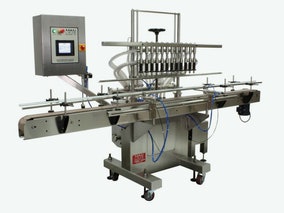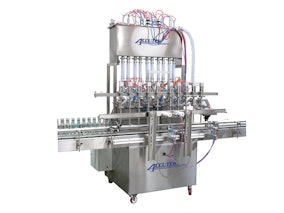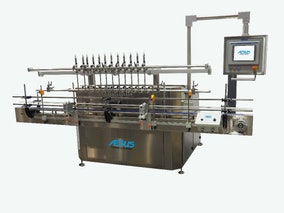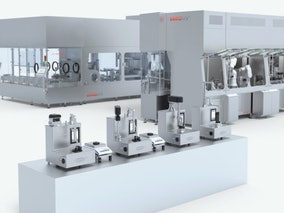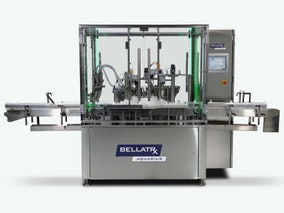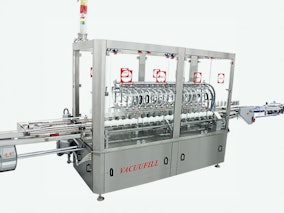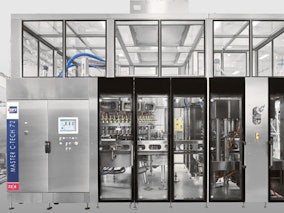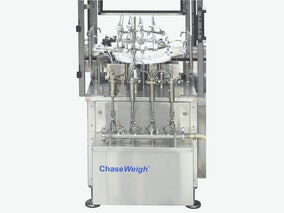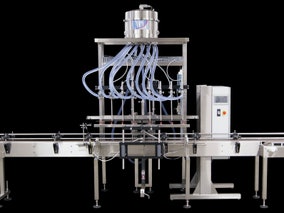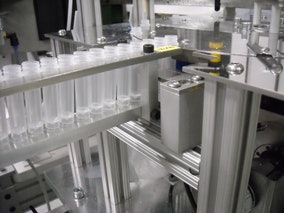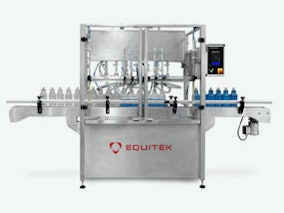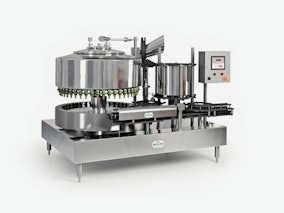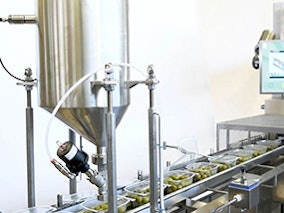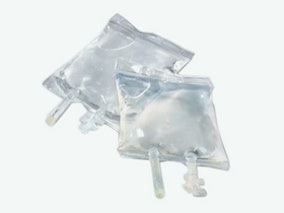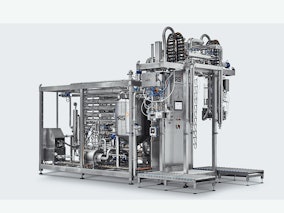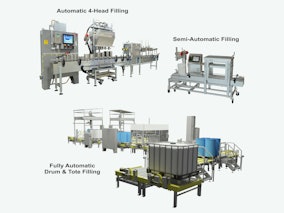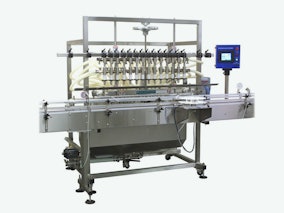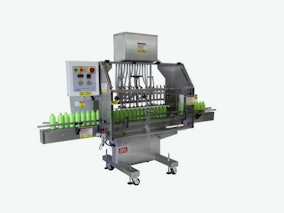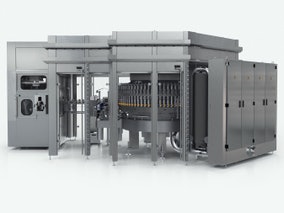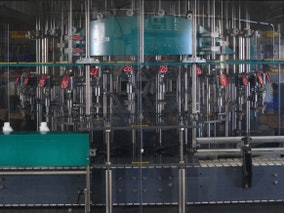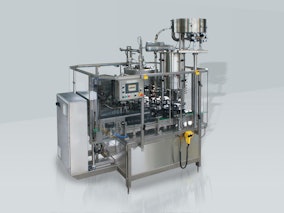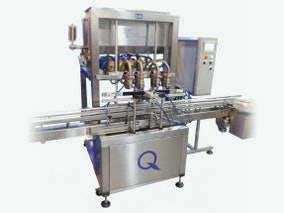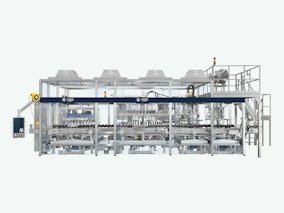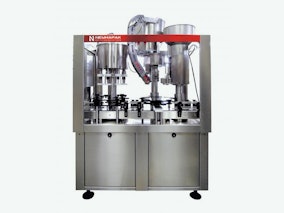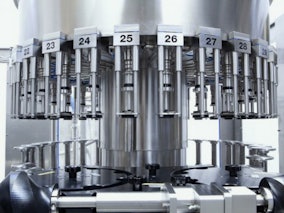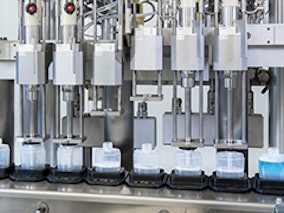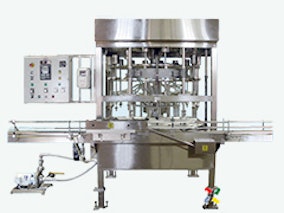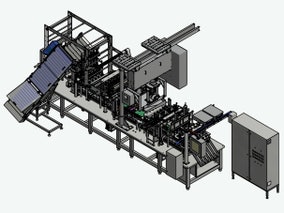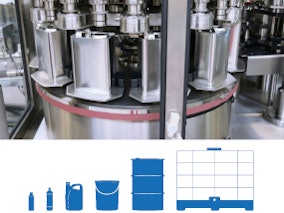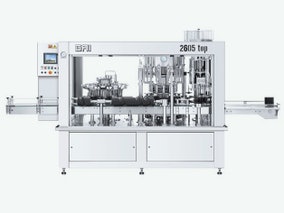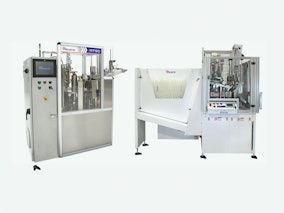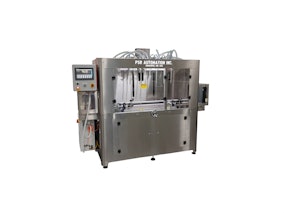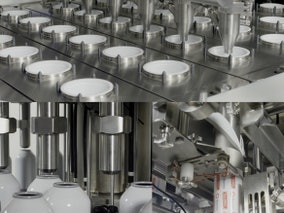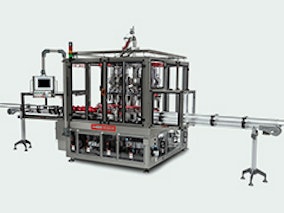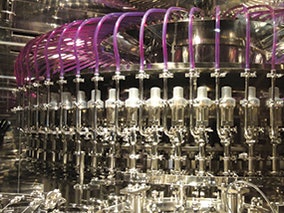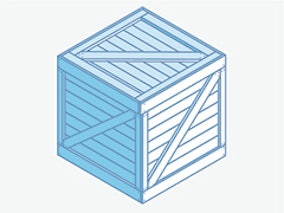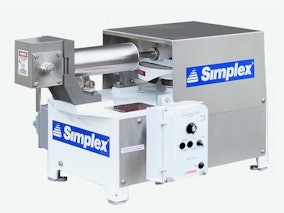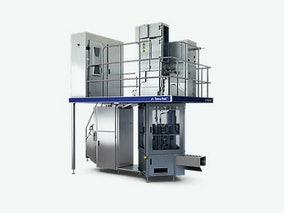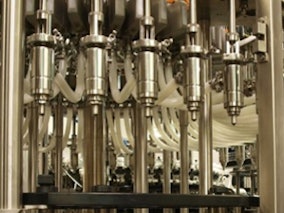Pressure Fillers
(40 companies)These liquid filling machines, also known as pressure gravity fillers, dispense higher viscosity liquids by placing pressure on the liquid through displacement pumps. Are you considering purchasing new filling, capping or closing machinery? Learn more about what to look for in your next purchase.
-

Acasi Machinery Inc
Acasi Machinery offers a wide product line of liquid filling machines including piston fillers, overflow fillers, pump fillers, flow meter liquid filler among other designs. Bottle filling machines are designed to accommodate a large range of products from thin liquids to thick products with or without particles as well as a range of speeds with semi-automatic bottling machines to inline filling machines automatic and semi-automatic to accommodate speeds up to 120 bottles per minute. Acasi’s rotary fillers accommodate faster speeds of up 300 bottles/minute.
You are currently not logged in -

Accutek Packaging Equipment Co., Inc.
For more than three decades, Accutek has been renowned for delivering exceptional liquid-filling machines to its customers. The specific requirements of the customer's products dictate the type of bottle-filling machine that is best suited for the task. Accutek's objective is to ensure the accurate dispensing of the product in an appealing bottle that effectively highlights the product’s offerings, giving brands a competitive edge. Accutek's machine offerings encompass a wide range of options, including timed fill filling machines, piston filling machines, level filling machines, vacuum filling machines, pump filling machines, net weight filling machines, tablet counters, and corrosive filling machines.
You are currently not logged in -

Aesus Inc.
Aesus Inc. manufactures liquid fillers that can handle a range of viscosities, from water and water-like liquids to oils and creams. Filling machines feature simple dial-in fill volume adjustments to change over from applications requiring milliliters from ones requiring gallons, all on the same machine. Running up to 160 bottles/min., the Aesfill AF 4 Liquid Filler is a fully guarded, variable speed, bottom-up fill system with features such as neck clamp, no-bottle/no- ill feature, no-fill feature for misaligned dive, a bottle back-up machine stop, recipe management with color touchscreen, clamp on/off contact parts for fast changeover and no-drip nozzle fills. Liquid filler can run a range of sizes, from 3 ml to multiple gallons.
You are currently not logged in -

Bausch + Stroebel Machine Company Inc.
Bausch & Stroebel Machine offers liquid filling systems for pharmaceutical production applications. Featured products from its extensive line include the AFV filling and closing of ampoules and vials, which uses rotary piston pumps in continuous, intermittent-motion rotary machines as well as intermittent-motion linear formats.
You are currently not logged in
-

BellatRx Inc.
BellatRx offers a full range of fully automatic and semi-automatic packaging systems to fill non-viscous and viscous liquids accurately. Liquid fillers include monoblocs, inline fillers, piston and tube fillers, that handle microtubes, vials and cartridges in pharmaceutical, cosmetic, biotech, food, e-liquid and other industries.
You are currently not logged in -

Capmatic Ltd.
Capmatic supplies an extensive range of liquid filling machines for a wide variety of applications from pharmaceutical to food and beverage applications and beyond. Capmatic offers machines with inline, pressure, gravity fill, piston, peristaltic, piston, gravity, tare in/tare out filling technologies ranging from tabletop units to monobloc configurations. Featured amongst Capmatic’s dozens of liquid fillers is Vacufill, an automatic vacuum filler for liquid, semi-viscous and foamy products that is designed as a closed-loop system with negative pressure for applications including filling oils, perfumes, and nail polish.
You are currently not logged in -

CFT SpA
CFT is a manufacturer of a broad range of food, beverage and non-food liquid filling systems in a variety of configurations and formats. Highlights from the CFT product line include the MAGIC FW automatic flow meter filler for hot/cold filling of viscous and smooth food products ranging in speed from 5,000 to 85,000 containers/hr. CFT also supplies hygienic weigh filling machines, level fillers for carbonated products, keg systems for beer filling, vacuum fillers for vinegar and syrup, gas fillers, volumetric fillers for oil and detergents and numerous other filling machines.
You are currently not logged in -

Chase-Logeman Corporation
Chase-Logeman’s monobloc filling equipment offers multiple capabilities while maintaining a small footprint, serving a wide range of industries that fill and close a variety of vials, bottles, and containers. Company designs and tests machinery to meet the specific needs of the end user because each machine is built for the specific application.
You are currently not logged in
-

E-PAK Machinery, Inc.
E-PAK Machinery manufactures volumetric pressure and gravity filling machines suitable for filling virtually any water-thin to semi-viscous liquid. Gravity filling systems are ideally suited for thin, foamy products while pressure/gravity filling systems have the ability to handle slightly more viscous liquids. E-PAK customizes each model with the right combination of contact parts per end-user product requirements as well as the appropriate quantity of fill valves and accessories to meet current and future production demands.
You are currently not logged in -

Engineered Automation of Maine
Engineered Automation of Maine supplies liquid filling equipment including vial, cartridge, jar filling and capping equipment. High-speed, high-precision container filling and capping equipment can be custom engineered to the customer’s product. Featured machines include a vial/tube filling system built to handle small polypropylene screw on cap microcentrifuge tubes and vials. This automated system is designed and built to feed vials and caps from vibratory bowls. The standard design can be modified to handle other similar products.
You are currently not logged in -

EQUITEK
Liquid filling systems from Equitek range from semi-automatic to automatic machines, handling non-viscous to viscous products. Equitek´s filling machines are engineered for medium size product runs of up to 350 cpm and handling applications of up to 4,000 pounds.
You are currently not logged in -

Filler Specialties, Inc.
Filler Specialties specializes in the design, manufacture, and remanufacture of monobloc filler/cappers. Filler Specialties has the monobloc pressure gravity filling and capping machine features speeds from 10 to 700 containers per minute. Fillers run plastic and glass containers from 2 oz/60 ml to 2½ gallon/10 liter. Other features include EMV external mount filling valves. Standalone fillers and cappers are also available.
You are currently not logged in
-

groninger
groninger produces an extensive line of machines for applications including filling pharmaceutical liquid products in syringes, vials and cartridges under aseptic sterile conditions as well as filling cosmetic liquid products in bottles, jars and other containers. Fully automatic, continuous linear filling and closing machines for filling bottles in pharmaceutical applications are designed for laminar-flow or isolator operation and are capable of outputs of up to 48,000 units/hour. For haircare and fragrance products, groninger offers fully automatic filling machines that handle multiple shapes and sizes of containers, feature Siemens or Allen-Bradley controls, and reach outputs up to 12,000 units/hour.
You are currently not logged in -

Harpak-ULMA Packaging, LLC
Liquid filling system options from G. Mondini include gravity fillers, lobe fillers, and piston fillers, depending on the required accuracy, particulate size, and other factors. This broad range of liquid filling equipment ensures Harpak-ULMA has the proper equipment to match the customer’s needs.
You are currently not logged in -

Harro Hofliger, Inc.
Harro Höfliger offers liquid filling systems for injectables, liquid applications, drug delivery devices or soft-mist inhalers, from processes requiring aseptic and liquid dosing to sterile packaging. Company supplies custom-fit liquid dosing systems that fill many different dosage forms including IV bags, single and dual-chamber containers such as syringes, auto-injectors and tubes as well as cartridges for liquid-based inhalers. Line of dosing systems for liquid media handles various viscosities and characteristics. Company also offers complete aseptic and aseptic-toxic concepts and combined filling and assembly technology.
You are currently not logged in -

HRS Heat Exchangers
The HRS AF Series is a range of single and dual head aseptic fillers used in bag-in-box and bag-in-drum type sterile packaging solutions. The AF Series has filling nozzles of 25 and 50 mm depending on the product, and works with pre-formed and pre-sterilized bags of between 5 and 1,000 L. The aseptic filler has been designed for high and low acidity products and can fill fluids, concentrates and products with particulates. Its automatic head design provides high filling speeds and performs motor driven vertical movements. Other features include automatic CIP cleaning, reliable weighing, control
You are currently not logged in
-

Ideal Pase, A Massman Company
Ideal-Pak® liquid filling machines are designed to deliver the highest levels of precision, productivity, ease of use, and reliability in automatic, semi-automatic or manual configurations. Individually designed to suit the needs and budgets of their customers, Ideal-Pak® automatic liquid fillers include automatic PLC-controlled conveyor systems, lid placers and closers for hands-free operation. In addition, all Premier Line filling systems feature a touch screen HMI with recipe storage and SPC with check-weigh data logging and Ethernet connectivity to deliver the highest accuracy, consistent fills, and maximum throughput. Contact us today to find out more about our line of automatic liquid filling machines. Ideal-Pak®’s semi-automatic liquid filling machines deliver the flexibility to process smaller batches of product efficiently while maintaining high accuracy.
You are currently not logged in -

In-Line Packaging Systems, Inc.
In-Line Packaging Systems offers liquid filling solutions for a wide range of applications, from carbonated beverage fillers to overflow filler and manual beer bottle fillers. The In-Line mini bottle filler and cap tightener system utilizes advanced technology and people-friendly controls to provide a simple and cost-effective method for container handling, filling and cap torqueing, accommodating plastic, glass, and metal containers ranging in sizes and configurations. Based on a fill-to-level principle, the Model OF Pressure Overflow Filler delivers a quantity of flowable liquid into the container until it reaches an adjustable fill height. Other models include an 8-head gravity overflow filler, a micro carbonated filler and related equipment.
You are currently not logged in -

Kaps-All Packaging Systems, Inc.
Kaps-All supplies machines designed for multipurpose liquid filling operations, from free-flowing to viscous products. Offering a wide range of filling methods and techniques in automatic, semi-automatic and rotary configurations, the Kaps-All product line includes the FA-G-E gravity filler, a fully automatic, microprocessor controlled machine for straight line liquid filling of free flowing liquids (including foaming thin products), suitable for glass, plastic or metal containers. Model FA-P Expandable Fills-All Model FA-P Pressure Filler features two stainless steel gravity/pressure nozzles that are adjustable for varying fill heights (expandable to 18 nozzles) and accommodates a bottle range of 1-3/4 inch high to 1 gallon containers (glass, plastic or metal).
You are currently not logged in -

KRONES
Whether for glass bottles, PET containers or cans, for filling, labelling or packing, for water, beer or soft drinks, Krones offers a customized system solution for every process step, every container type and every beverage category. The wide portfolio comprises all machines required for beverage production, including fillers suitable for every container type and labelers for all conventional labelling and decoration variants, as well as all dry-end systems.
You are currently not logged in
-

Laub/Hunt Packaging Systems
Laub\Hunt Packaging Systems is a manufacturer of liquid filling equipment, offering a variety of filling systems for products ranging from water-thin to highly viscous. Inline and rotary fillers run at speeds up to 800+ cpm, filling any pumpable non-carbonated, non-dairy product. Additionally, Laub\Hunt specializes in bleach fillers as well as other filling equipment widely used in industrial and household chemicals, automotive fluids, personal care products, cosmetics, and food and beverages.
You are currently not logged in -

Linker Equipment Corporation
Linker specializes in monobloc liquid filling systems for rinsing, filling and capping (RFC), water fillers, pressure gravity fillers, pressure fillers, metered fillers and net weight fillers for various types of containers, including 5-gallon. Featured fillers include the RFC for water filling, designed for automatic rinsing, filling (water, tea, and juices) and capping of glass or PET bottles. Features a range of 24 to 96 valves with a capacity of filling from 80 bottles of 0.5L to 1000 bottles of 0.5L per minute.
You are currently not logged in -

Liquid Packaging Solutions, Inc.
Liquid Packaging Solutions manufactures filling equipment for products thick and thin and bottles small and large. From fill-to-level and volumetric to net weight, piston fillers and more, LPS bottle fillers are designed to handle almost any liquid product.
You are currently not logged in -

MBF North America Inc.
MBF North America designs and builds dedicated liquid fillers as well as monoblocs used in spirits, wine, beer, water and juice bottling lines. Fillmatic LV low-vacuum fillers are designed for minimum oxygen absorption and maximum preservation of alcohol and flavors, available in Tronic® mechanical or electronic configuration. The electronic version offers the possibility to customize and memorize the working parameters for each type of product and bottle. Fillmatic HP/HPT machines are counter pressure isobaric filling machines and/or turret for smooth wines, sparkling wines, beers and carbonated drinks, that can be filled cold and/or at room temperature, for both glass and PET bottles. Designed to provide a processing versatility for any bottle and cap format, the MBF Superbloc™ is a compact, comprehensive and customizable bottling line that integrates rinser, filler, corker/capper, capsuler and labeler in a single machine.
You are currently not logged in
-

Newmapak Ltd.
Newmapak distributes bottle and can fillers tailored for both low-volume and high-volume applications, carefully considering the viscosity of the client’s product, filling speeds, temperature requirements, and the integrity of the finished product. Their extensive product line includes machines designed for a wide range of applications, including beverages, sauces, oils, syrups, and other food products.
You are currently not logged in -

Omnia Technologies
Omnia Technologies distributes liquid filling systems from AVE Technologies. Featured machines include gravity filling systems for still beverages. Once the pre-set filling level is achieved, the product in excess is recollected to the filling tank. The filling tank is completely manufactured in AISI316, as well as all the parts in contact with the product. In case the machine has to treat PET/PE/HDPE bottles, the filler can be equipped with a neck holding system. Other filling systems include vacuum filling systems, isobaric filling machine, hot filling FHP, volumetric filling systems, as well as plastic and glass bottle filling machines.
You are currently not logged in -

OPTIMA Machinery USA Corporation
Optima manufactures filling equipment designed for accuracy across a range of formats in cosmetics, pharma, food and other target markets. A wide range of different filling technologies are available with scalable filling modules that can be cleaned quickly and can even be explosion-protected if required. Optima’s filling technologies are engineered to reliably fill products with low viscosity like perfume to high viscosity products such as mascara. Optima machines are designed to meet different hygiene standards required by products, ranging from manual cleaning and trolley solutions to CIP/SIP/COP systems to meet the highest pharmaceutical standards for cleaning and sterilizing plants.
You are currently not logged in -

Packaging Dynamics, Ltd.
Packaging Dynamics, Ltd. supplies Model SLA Automatic Straight-Line Fill to Level liquid filling machine for hard to fill foamy and viscous products. Featuring an Allen Bradley programmable Logic Controls (PLC) and operator interface, this machine is engineered for flexibility, filling containers as small as 2 oz and as large as 2 1/2 gal (F-style) at rates up to 80 containers per minute. Standard features include a product pump, reservoir, pressure manifold, AB photo sensors and a variable speed on-board 10 foot conveyor and drive system.
You are currently not logged in
-

Packline USA
Liquid fillers can be used for food industry applications such as filling sauces, salsas, hummus, deli salads and dips into a rigid container or pouch, with option of multiple products and toppings. Film sealed with modified atmosphere packaging (MAP) option and subsequent rigid lid placement.
You are currently not logged in -

PACK'R
PACK’R designs and engineers specialty liquid filling and capping machines to fit the customer’s container, factoring shape, material, size and cap. Offering the capability to fill containers ranging from the smallest bottle to jerrycans, pails and drums to the largest intermediate bulk container (IBCs) and totes, PACK’R engineers and technicians apply years of experience and extensive industry knowledge to designing and manufacturing filling and capping equipment for a wide range of industries, including chemical, agrochemical, petrochemical, vegetable oils, food, paint and coatings.
You are currently not logged in -

Prospero Equipment Corporation
Prospero distributes a range of rotary filling equipment, including GAI’s liquid filling machines for wine and related products. The S family of fillers performs rinsing, de-aeration, filling, inert gas injection, and vacuum corking. Targeted to medium and small sized wine producers, the S series fillers can run still products up to 3,000 bph. These fillers are designed for high quality, reliability and ease of use. A wide range of accessories and machine extras are available to meet the needs of each producer.
You are currently not logged in -

ProSys Fill LLC.
ProSys is a leading manufacturer of semi-automatic and fully automatic liquid filling machines for various industries, including pharmaceutical, cosmetic, lubricant, food, sealant, and adhesive. Since 1985, they have provided filling solutions for squeeze tubes, syringes, airless pumps, cartridges, jars, custom containers, and hot melt applications, with U.S. sales, manufacturing, and customer service facilities in Southwest Missouri. ProSys offers flexible combination systems that handle plastic and metal tube filling, airless pumps, and cartridges with fill accuracy of +/- 0.1% by volume. Their equipment features turnkey designs, air-free vertical bottom-up filling, explosion-proof controls, and tool-free release systems for easy changeovers. ProSys also manufactures drum and pail presses, which provide efficient solutions for handling large-volume containers such as 5-gallon pails, offering both manual and pneumatic press options to ensure smooth material flow during filling of liquids.
You are currently not logged in
-

PSR Automation Inc.
The PSR Automation Inc. Servo Filler is designed as a versatile machine that can fill products from 2-oz. containers to 2.5-gallon bottles without any change parts, and perform changeovers in under 15 minutes with the quick changeover system. "The PSR Servo Filler can increase your output by saving on changeover times and improving fill rates," says PSR.
You are currently not logged in -

R.A Jones
R.A Jones makes filling equipment for aerosol, chub, and cup packaged products. Autoprod filling systems fill cups, tubs, trays and jars up to 840 cups per minute. Handles liquid and viscous products of various types such as yogurt, ice cream, dips, butter, soups, and more. In addition to high speeds, equipment boasts CIP, volumetric and flowmeter filling options and extended shelf life with R.A. Jones’ patented MAP system. KP-Aerofill aerosol equipment is available in single units for lab testing or complete aerosol lines running up to 600 cans per minute.
You are currently not logged in -

Ronchi America, LLC
The Exacta family of flow meter fillers employs innovative features and state-of-the-art technology to filling industry applications in liquid or high-viscous products. Exacta is designed for filling applications where flexibility, ease of use, rapid change-over, automated CIP/SIP and filling accuracy operations are required.
You are currently not logged in -

Shibuya Hoppmann
Shibuya Hoppmann offers the E-Beam and H202 aseptic liquid filling systems, as well as conventional filling and capping systems. Shibuya's line of filling systems is designed for flexibility; fillers handle multiple bottle shapes and sizes, including square and elliptical containers. Applications include juices, teas, coffee, milk, protein/energy drinks, or carbonated sodas. Liquid fillers use the net weight filling method for high accuracy. E-Beam aseptic filling systems require no chemicals or water required for bottle sterilization and are designed to help reduce the total cost of ownership (TCO).
You are currently not logged in
-

SIGMA Equipment, Inc.
SIGMA Equipment offers a broad selection of used liquid filling machines catering to diverse industries, including food, beverage, cosmetics, and pharmaceuticals. Their inventory features equipment capable of handling products of various viscosities, from water-like liquids to thicker substances like creams and pastes. The offerings include volumetric, gravity, overflow, piston, and pump fillers, ensuring precise and efficient dispensing for containers of all shapes and sizes. With options suitable for small-scale operations to high-speed automated production lines, SIGMA provides flexible solutions to meet specific operational needs. Browse SIGMA's current machinery on sale at the link below.
You are currently not logged in -

Simplex Filler Company
For over fifty years, Simplex Filler Company has been designing and manufacturing filling equipment to handle liquid ranging from water thin to highly viscous products for clients worldwide. Simplex offers volumetric fillers and pressure fillers as well liquid filling accessories. Simplex Model AS-1 is an electric, table-top, semi-automatic piston filler that is designed to help growing businesses replace their manual filling operations. Other products include the Simplex Model V-100, a fully automated, cam-action, single-head volumetric piston filler for liquid, semisolid and/or particulate filling that has a fill volume of up to one gallon in one shot – ideal for difficult liquid products.
You are currently not logged in -

Tetra Pak Inc.
Tetra Pak manufactures a vast range of liquid filling machines for aseptic brick pack applications ranging from juice and sauce to dairy and pet food. Featured fillers include the Tetra Pak A1 for Tetra Classic aseptic brick packs, designed as a reliable machine that is simple enough for one person to operate. Highly efficient use of utilities enables a low operating cost and a good environmental performance. This aseptic filler reaches production capacity up to 17,500 packs/hour for low unit cost. Machines feature easy conversion between five sizes and are designed for long production runs.
You are currently not logged in -

U.S. Bottlers Machinery Co.
From high-grade stainless steel machines for caustic, hot-fill products to PVC that handles highly-corrosive bleach, U.S. Bottlers customizes its filling machines to the application and filling environment. Product line includes pressure gravity fillers, electronic gravity fillers, flow meter fillers, vacuum fillers, and funnel fillers. U.S. Bottlers designs, fabricates, and tests its fillers in-house. In addition, U.S. Bottlers offers filler and capper technology in one simplified, integrated monobloc system.
You are currently not logged in
Report an Issue
Incorrect/inaccurate categorization? Report inaccuracies or problems »
Related Liquid Fillers searches
More on Pressure Fillers
Pressure fillers, also known as pressure gravity fillers, are used to dispense higher viscosity liquids by placing pressure on the liquid through displacement pumps. They’re widely used in industries such as food and beverage, pharmaceuticals, cosmetics, and chemicals.
The main advantage of pressure fillers is their ability to fill a wide range of containers with varying shapes and sizes, making them an ideal choice for manufacturers who require flexibility in their filling operations. These machines can handle a variety of container materials, including glass, plastic, and metal, and can fill containers of different shapes, such as round, square, or rectangular.
One key feature of pressure fillers is their ability to accurately fill containers with the desired amount of product, achieved through the use of displacement pumps, which apply pressure to the liquid being filled. Pressure forces the liquid through a filling nozzle and into a container. The filling nozzle is designed to create a seal with the container, ensuring that the liquid is dispensed accurately and without spillage.
Another one of their advantages is their ability to handle high viscosity liquids. These liquids can be difficult to fill using other filling methods, such as gravity filling or volumetric filling. Pressure fillers are able to dispense high viscosity liquids by applying pressure to the liquid, which helps to overcome the resistance of the liquid and allows it to flow into the container more readily.
Pressure fillers are also designed for high efficiency on the filling line. They frequently can fill a large number of containers in a short amount of time, due to the fact that the filling process is automated, as the machine controls the flow of liquid and the filling nozzle. This reduces the need for manual intervention, which can be time-consuming and increase the risk of errors.
Pressure fillers can also be easy to operate and maintain. They’re frequently designed with user-friendly controls and can be easily adjusted to accommodate different container sizes and filling volumes. The machines are also easy to clean and sanitize, an important characteristic in industries such as food and beverage and pharmaceuticals, where hygiene is critical.
Overall, pressure fillers are a key piece of equipment for manufacturers in the packaging industry, offering a range of benefits, including flexibility, accuracy, efficiency, and ease of use and maintenance. With the ability to handle a wide range of container shapes and sizes, as well as high viscosity liquids, pressure fillers are a versatile and reliable solution for filling liquid products into containers.
Here on PMMI’s ProSource directory, we have compiled a list of trusted manufacturers and suppliers of pressure filling systems. Scroll through the offering here and find the one that best matches your needs today.
